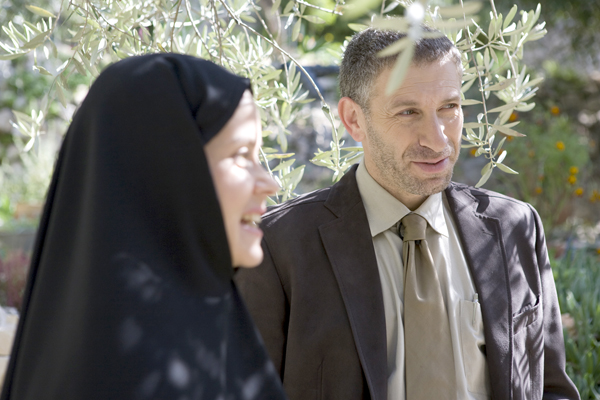|
Reviews of Recent Independent, Foreign, & Documentary Films in Theaters and DVD/Home Video

THE HUMAN RESOURCES
MANAGER
At a large bakery factory, the owner’s widow (Gila Almagor, the grande dame of Israeli film) imperiously calls in the company’s human resources manager (Mark Ivanir) after hours to handle a tough public relations assignment. A newspaper is about to publish an accusatory exposé that the unclaimed body of a bombing victim was one of their neglected employees. He gets his secretary, baby in tow, to come in late to interpret the woman’s incriminatory pay stub cited in the story. It belonged to Yulia Ragayev, a foreign worker hired as a cleaner on the night shift—and the only character identified by name in the film. The manager has to immediately solve the mystery of why the company didn’t notice Yulia’s absence in the several days since her death, while he also tries to repair his own fractured marriage and prove his devotion to his young daughter. Much like David Ofek’s documentary No. 17 (2003) traced a real bombing victim, the manager follows Yulia’s life among the desperate foreigners welcomed into Israel to replace Palestinians, from the bureaucracy at the morgue to her small apartment. (Her neighbors had re-christened her Ruth, the Biblical migrant worker.) Under pressure from the persistent newspaper reporter, who the manger resentfully dubs “The Weasel” (Guri Alfi), the shrewd owner sets the manager off to repatriate Yulia to her homeland with the journalist. Based on A. B. Yehoshua’s 2004 novel A Woman in Jerusalem, the film becomes a poignant, and even amusing, road movie. The grim and broken city that the coffin and its Israeli escorts land in is as anonymous as the characters, and, though filmed in Romania, it stands in for any post-Soviet bloc country filled with families riven by economic, social, and political change, including Yulia’s ex-husband (Bogdan Stanoevitch) and sullen, alienated teen son (Noah Silver). The son stubbornly insists on reuniting his mother with his grandmother in their ancestral village, and so a motley crew of locals and Israelis sets off on an odyssey through a bleak, stormy landscape that justifies Yulia’s risky emigration. Turning swords into plowshares, they ironically repurpose Cold War relics, from a tank to a nuclear bunker, to smooth the way. A rich panoply of very individual personalities enliven the trip, including the grandmother (Irina Petrescu), who impressively equals the owner in determination, and it’s a pleasure to see the wry Ivanir portray a lot more complexity than the stereotyped Russian gangsters he’s played on many American television shows lately.
Director Eran Riklis has
individuated people living on Israel’s politically charged borders
before, in
Lemon Tree (2008) and The Syrian Bride (2004).
Here he personalizes Israel’s strife within a larger context and finds
more signs of hopeful romanticism than the novel.
Nora Lee Mandel
|

